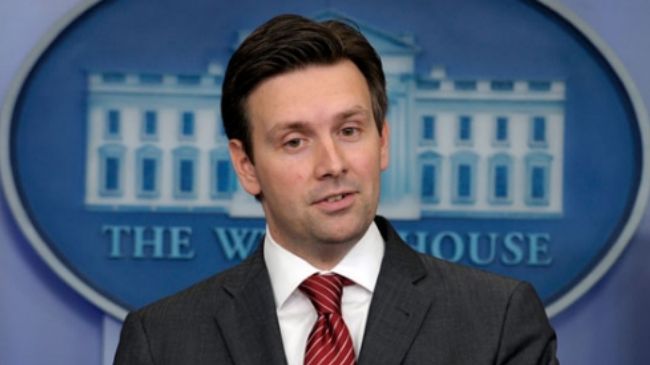 White House Press Secretary Josh Earnest[/caption]
White House Press Secretary Josh Earnest[/caption]Washington: The chances of clinching a nuclear deal with�Iran�are 50/50 "at best", the White House said on Tuesday as negotiators in Switzerland raced against the clock to close the gaps.
"In the mind of the president the odds have not moved," and "some of the most difficult issues ... have yet to be resolved," White House spokesman Josh Earnest said in Washington.
This followed comments from Iran`s nuclear chief at the talks in Lausanne involving US Secretary of State John Kerry that "90 percent of the technical issues" have been agreed.
"In most of the issues we have come to mutual agreements -- we have differences only in one major issue which we will try to solve in this evening`s meeting," Ali Akbar Salehi said.
Iran and six world powers -- the US, Russia, Britain, France, Britain and Germany -- aim to agree the framework of a nuclear deal by March 31 and then have a full deal by July 1.
Such an agreement, they hope, will convince the world that Iran will not develop nuclear weapons under the guise of its civilian programme, a goal Tehran strenuously denies having.
The accord would involve Iran agreeing to scale down its nuclear activities to within strict limits in return for relief from sanctions suffocating its economy.
If they manage it and the accord holds, both sides hope it will end a 12-year standoff and help normalise Iran`s international relations at a particularly volatile time in the Middle East.
Two deadlines to get a deal in July and November were missed but intense political pressure in Washington means President Barack Obama`s administration can hardly afford to extend yet again, experts say.But it is a highly complex undertaking, with negotiators having to work out the future scope of Iran`s programme and the timing of sanctions relief, amongst other thorny topics.
"Iran wants as much sanctions relieved as possible up front in the deal. The United States and its allies in the P5+1 would like to have sanctions relief come in phases," Reza Marashi from the National Iranian American Council (NIAC) told AFP.
As a result US negotiators in the marathon talks were more downbeat than Salehi, with one senior administration official -- involved in the technical side of the negotiations -- saying Tuesday there was still "a ways to go".
The official said on condition of anonymity that, specifically concerning technical dimensions, "even in this space we still have some tough issues to address."
A second US official said Monday that "this is a Rubik`s Cube or a puzzle ... and until all the pieces click into place, you don`t have the whole picture, since this is all interlocking elements that affect each other."
Kerry and Iranian Foreign Minister Mohammad Javad Zarif met for almost five hours on Monday and met on and off all day Tuesday together with Salehi, US Energy Secretary Ernest Moniz and others.
Political directors from the other five powers involved began arriving in Lausanne on Tuesday and were due to meet on Wednesday, the EU said.
It remained unclear how much longer the talks will last or whether other foreign ministers would join Zarif and Kerry. Critics in the United States and in Iran`s arch foe Israel, widely assumed to have nuclear weapons itself, fear that the mooted restrictions on Iran`s nuclear programme won`t go far enough.
In Washington 47 Republican senators last week wrote an open letter to Iran`s leaders telling them that Congress could alter any deal and that a future president could tear it up.
Obama, a Democrat, is also fighting to stop the Republicans bringing new legislation that would force him to submit any deal to Congress for approval.
In Iran though, parliamentary speaker Ali Larijani said Monday that lawmakers would not block any deal as long as it is approved by supreme leader Ayatollah Ali Khamenei.
What might emerge in Lausanne by the end of the month -- or possibly this week -- is unclear, but a "concrete understanding" is crucial, expert Ali Vaez from the International Crisis Group told AFP.
"If there is an agreement (this month) I don`t see how it can be meaningful without some quantitive measures," the first US official said.
By AFP










